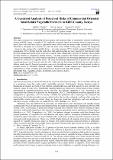A Gendered Analysis of Perceived Risks of Commercial Oriented Smallholder Vegetable Farmers in Kilifi County, Kenya

View/
Publication Date
2019Author
Judith M Mumba, Oscar I Ayuya, Kenneth W Sibiko
Metadata
Show full item recordAbstract/
This paper examines the relationship between gender and perceived risks of commercial oriented smallholder
farmers in Kilifi County. A sample of 332 smallholder vegetable farmers was selected from the study area. A 5-
point Likert scale and factor analysis approaches were used to rank and analyze risks encountered by farmers.
Thereafter, a chi-square test was used to evaluate the mean scores of risks across gender. Gender was categorized
– based on who manages the vegetable farms – into male managed (37%), female managed (24%) and jointmanagement (39%). Results from the study show that marketing risks are more frequent for male farmers while
the joint-management group mostly experience financial risks. Additionally, severity of financial risks is greater
for male farmers as compared to female farmers. The study concludes that female farmers were not prone to
financial and marketing risks which implied that financial availability and marketing opportunities are still scarce
to empower women in the vegetable sector. The study recommends implementation of policies that will help in
minimizing the gravity of financial risks that affect both male and female farmers. Policies that are tailor-made to
address gender specific financial constraints, more so in the informal sector, should be implemented in order to
promote access to affordable financial support. Additionally, female empowerment programs should be
implemented in order to increase their participation in domestic and high value markets
